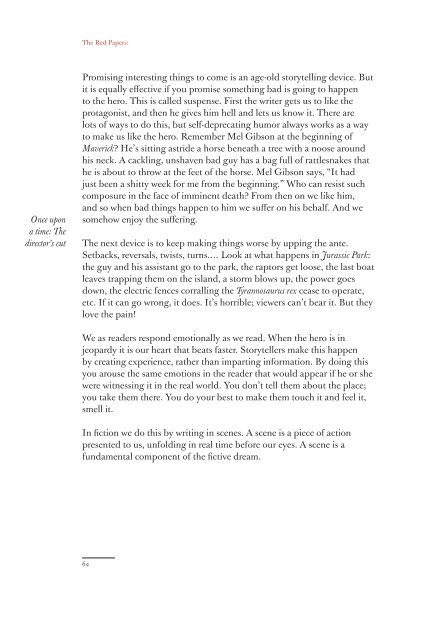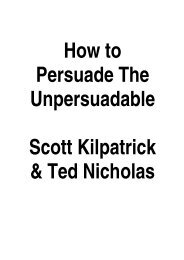1rZwMNa
1rZwMNa
1rZwMNa
Create successful ePaper yourself
Turn your PDF publications into a flip-book with our unique Google optimized e-Paper software.
The Red Papers:<br />
Once upon<br />
a time: The<br />
director’s cut<br />
Promising interesting things to come is an age-old storytelling device. But<br />
it is equally effective if you promise something bad is going to happen<br />
to the hero. This is called suspense. First the writer gets us to like the<br />
protagonist, and then he gives him hell and lets us know it. There are<br />
lots of ways to do this, but self-deprecating humor always works as a way<br />
to make us like the hero. Remember Mel Gibson at the beginning of<br />
Maverick? He’s sitting astride a horse beneath a tree with a noose around<br />
his neck. A cackling, unshaven bad guy has a bag full of rattlesnakes that<br />
he is about to throw at the feet of the horse. Mel Gibson says, “It had<br />
just been a shitty week for me from the beginning.” Who can resist such<br />
composure in the face of imminent death? From then on we like him,<br />
and so when bad things happen to him we suffer on his behalf. And we<br />
somehow enjoy the suffering.<br />
The next device is to keep making things worse by upping the ante.<br />
Setbacks, reversals, twists, turns.... Look at what happens in Jurassic Park:<br />
the guy and his assistant go to the park, the raptors get loose, the last boat<br />
leaves trapping them on the island, a storm blows up, the power goes<br />
down, the electric fences corralling the Tyrannosaurus rex cease to operate,<br />
etc. If it can go wrong, it does. It’s horrible; viewers can’t bear it. But they<br />
love the pain!<br />
We as readers respond emotionally as we read. When the hero is in<br />
jeopardy it is our heart that beats faster. Storytellers make this happen<br />
by creating experience, rather than imparting information. By doing this<br />
you arouse the same emotions in the reader that would appear if he or she<br />
were witnessing it in the real world. You don’t tell them about the place;<br />
you take them there. You do your best to make them touch it and feel it,<br />
smell it.<br />
In fiction we do this by writing in scenes. A scene is a piece of action<br />
presented to us, unfolding in real time before our eyes. A scene is a<br />
fundamental component of the fictive dream.






